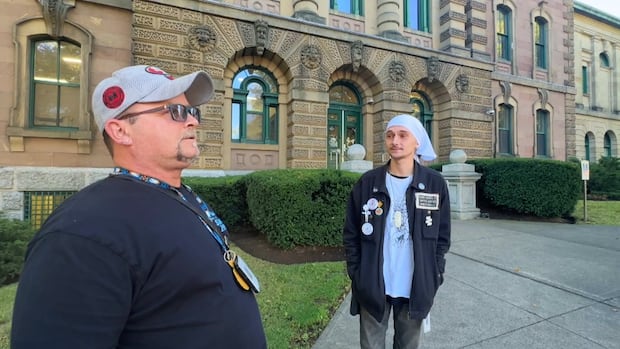Nova Scotia·NewMainline Needle Exchange staff help vulnerable people get to their hearings on time, bring proper paperwork and access legal aid services.People with lived experience with addiction, homelessness support others through court hearingsJosh Hoffman · CBC News · Posted: Sep 03, 2025 5:00 AM EDT | Last Updated: 3 minutes agoThomas Hendsbee, left. and Landon Morton work with Mainline Needle Exchange’s peer support program to help vulnerable people navigate the courts. (Josh Hoffman/CBC)Thomas Hendsbee and Landon (Morty) Morton understand why some people might feel hesitant about showing up for their court date.”It can be a scary thing, you know, for people who don’t know much about how the justice system really works,” Hendsbee said.That’s why Hendsbee and Morton are at Halifax provincial court twice a week as part of a peer support program operated by Mainline Needle Exchange, a Halifax-based harm-reduction organization.The pair help vulnerable people do things like make it to their hearings on time, bring proper paperwork and access legal aid services. They can also write support letters to show judges someone is advocating on their behalf and helping them navigate the judicial system.They said they help anywhere between three and 10 people a week. “Some people don’t even know what month it is and now they’re supposed to remember that on the 20th of two months from now they have to be here,” said Morton. “How are they supposed to be able to do that?”Morton said he was homeless when he was younger, which led to substance abuse and getting into trouble with the law.He was fortunate to get support from local organizations and now he wants to help others in the same situation he was in, he said.Hendsbee, who was in and out of the courts as a teenager, said many of the people they help may not have any support in their lives so some empathy can go a long way.”I think it gives them a little bit of confidence knowing that there’s, you know, someone in their corner for them,” he said.FundingThe peer support program is partly funded by the Law Foundation of Nova Scotia, an association that tries to improve public access to the judicial system. “The system breaks down if people don’t have proper access to justice,” said Dwight Rudderham, executive director of the foundation.Rudderham said many people in the court system are dealing with addiction or mental illness and if they don’t show up for their hearings then it only makes matters worse for them and the courts.These people struggle with basic challenges such as showing up to court on the right day, he said.”These are folks who truly need help and assistance or it’s just not going to be fair for them,” Rudderham said.’We’re all human beings’For Hendsbee and Morton, that help starts empathy.”There’s a lot of people who are often forgotten by society or maybe society treats them in a way where they don’t deserve help, but, we’re all human beings, right?” Morton said.”And it’s easy to judge someone if you’ve never walked [in] their shoes.”MORE TOP STORIESABOUT THE AUTHORJosh Hoffman is a reporter for CBC Nova Scotia. Josh worked as a local radio reporter all over Canada before moving to Nova Scotia in 2018.
Program helps vulnerable people navigate Nova Scotia court system










